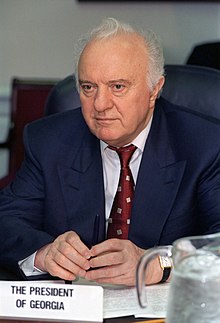Edvard Shevardnadze
| Eduard Ambrosiyevich Shevardnadze | |
|---|---|
| ედუარდ ამბროსის ძე შევარდნაძე | |
 |
|
| 2nd President of Georgia | |
|
In office 26 November 1995 – 23 November 2003 |
|
| Preceded by | Position restored; himself as the Head of State of Georgia |
| Succeeded by | Nino Burjanadze (acting) |
| Chairman of Parliament | |
|
In office 6 November 1992 – 26 November 1995 (Chairman of the Parliament from 4 November 1992) |
|
| Preceded by | Position established; himself as the Chairman of the State Council of Georgia |
| Succeeded by | Position abolished; Zurab Zhvania as the Chairman of the Parliament of Georgia |
| Chairman of the State Council of Georgia | |
|
In office 10 March 1992 – 4 November 1992 |
|
| Preceded by | Position established; Military Council as the interim head of state |
| Succeeded by | Position abolished; himself as the Chairman of the Parliament of Georgia |
| Minister of Foreign Affairs of the Soviet Union | |
|
In office 19 November 1991 – 26 December 1991 |
|
| Premier | Ivan Silayev |
| Preceded by | Boris Pankin |
| Succeeded by | Position abolished |
| Minister of Foreign Affairs of the Soviet Union | |
|
In office 2 July 1985 – 20 December 1990 |
|
| Premier |
Nikolai Tikhonov Nikolai Ryzhkov |
| Preceded by | Andrei Gromyko |
| Succeeded by | Aleksandr Bessmertnykh |
| First Secretary of the Georgian Communist Party | |
|
In office 29 September 1972 – 6 July 1985 |
|
| Preceded by | Vasil Mzhavanadze |
| Succeeded by | Jumber Patiashvili |
| Full member of the 26th, 27th Politburo | |
|
In office 1 July 1985 – 14 July 1990 |
|
| Personal details | |
| Born |
25 January 1928 Mamati, Guria, Georgian SSR, Soviet Union |
| Died | 7 July 2014 (aged 86) Tbilisi, Georgia |
| Nationality | Soviet (1928–1991) and Georgian (1991–2014) |
| Political party |
Communist Party of the Soviet Union (1948–1991) Independent (1991–1995) Union of Citizens of Georgia (1995–2003) |
| Spouse(s) | Nanuli Shevardnadze |
| Children | 2 |
| Awards |
|
| Signature | |
| Military service | |
| Service/branch | MVD |
| Years of service | 1964–1972 |
| Rank |
 Major General |
| Commands | Ministry of Public Order of the Georgian SSR (1965–68) Ministry of Internal Affairs of the Georgian SSR (1968–72) |
Eduard Ambrosiyevich Shevardnadze (Georgian: ედუარდ ამბროსის ძე შევარდნაძე; 25 January 1928 – 7 July 2014) was a Georgian politician and diplomat. He served as First Secretary of the Georgian Communist Party (GPC), the de facto leader of Soviet Georgia from 1972 to 1985 and as Minister of Foreign Affairs of the Soviet Union from 1985 to 1991. Shevardnadze was responsible for many key decisions in Soviet foreign policy during the Gorbachev Era. Following the dissolution of the Soviet Union, he was President of Georgia (or in equivalent posts) from 1992 to 2003. He was forced to retire in 2003 as a consequence of the bloodless Rose Revolution.
Shevardnadze started his political career in the late 1940s as a leading member of his local Komsomol organisation. He was later appointed its Second Secretary, then its First Secretary. His rise in the Georgian Soviet hierarchy continued until 1961 when he was demoted after he insulted a senior official. After spending two years in obscurity, Shevardnadze returned as a First Secretary of a Tbilisi city district, and was able to charge the Tbilisi First Secretary at the time with corruption. His anti-corruption work quickly garnered the interest of the Soviet government and Shevardnadze was appointed as First Deputy of the Ministry of Internal Affairs of the Georgian SSR. He would later become the head of the internal affairs ministry and was able to charge First Secretary (leader of Soviet Georgia) Vasil Mzhavanadze with corruption.
As First Secretary, Shevardnadze started several economic reforms, which would spur economic growth in the republic—an uncommon occurrence in the Soviet Union because the country was experiencing a nationwide economic stagnation. Shevardnadze's anti-corruption campaign continued until he resigned from his office as First Secretary. Mikhail Gorbachev appointed Shevardnadze to the post of Minister of Foreign Affairs. From then on, with the exception of a brief period between 1990 and 1991, only Gorbachev would outrank Shevardnadze in importance in Soviet foreign policy.
...
Wikipedia
